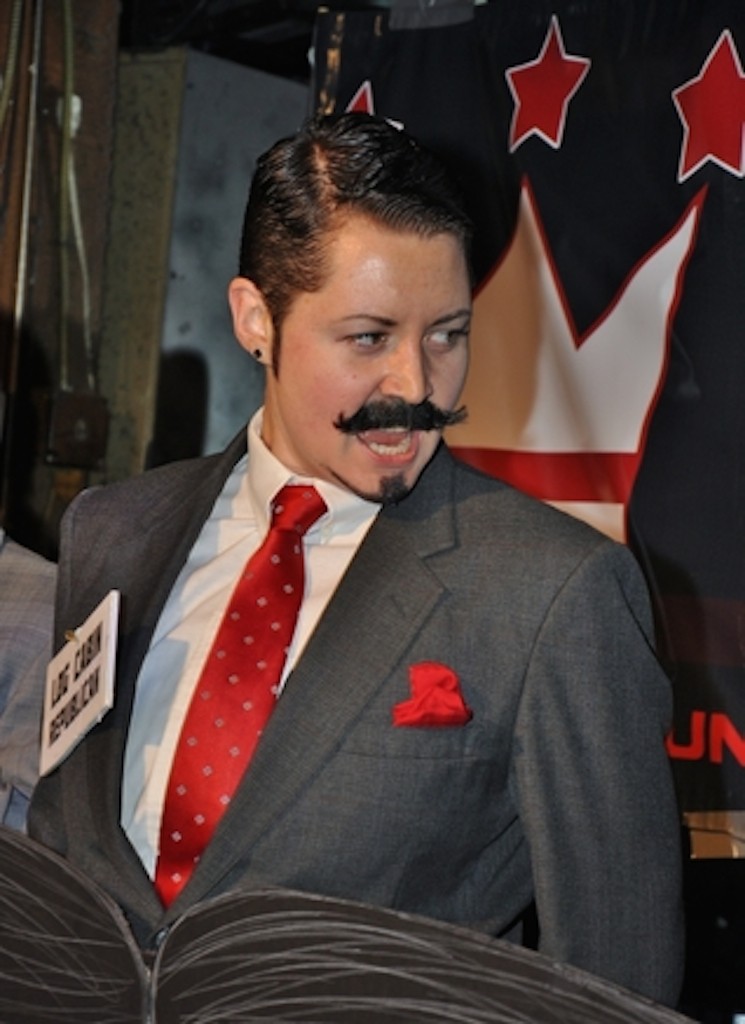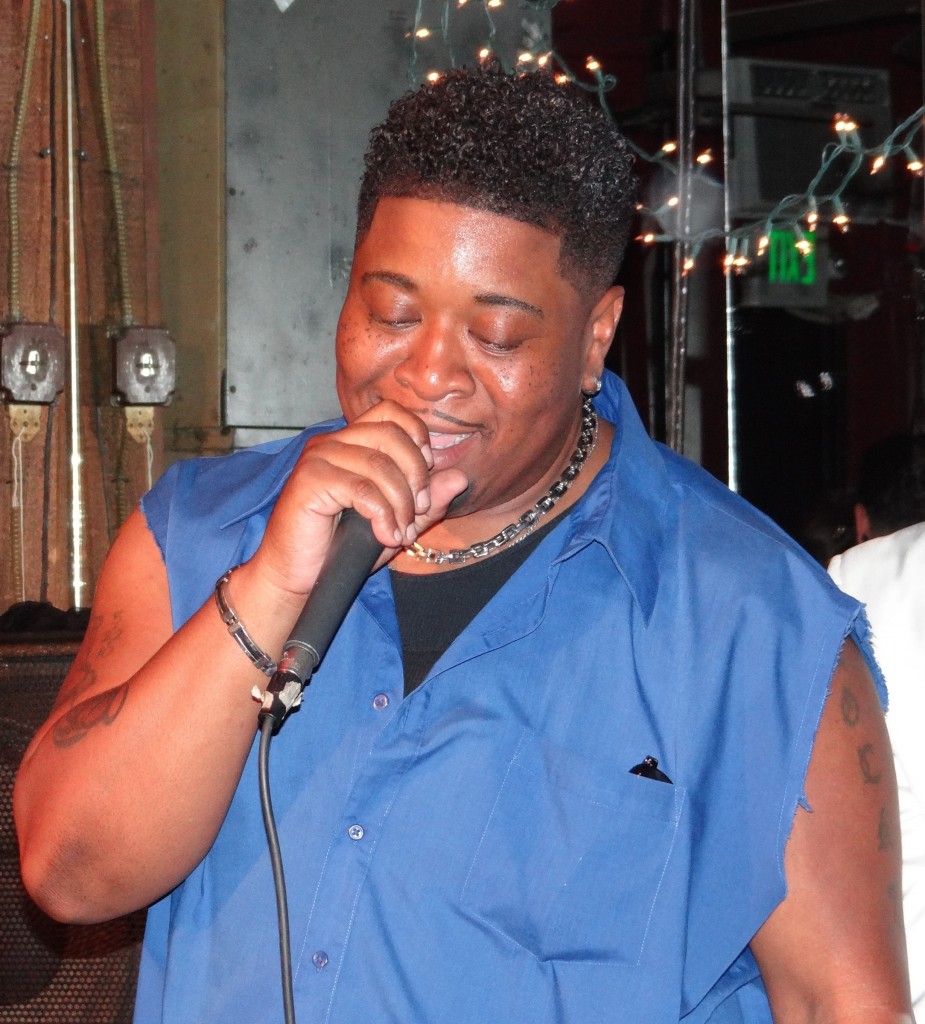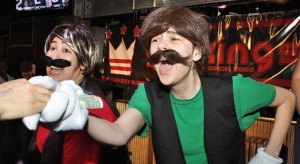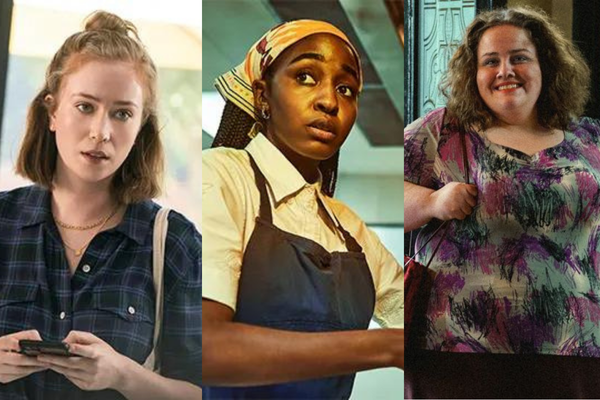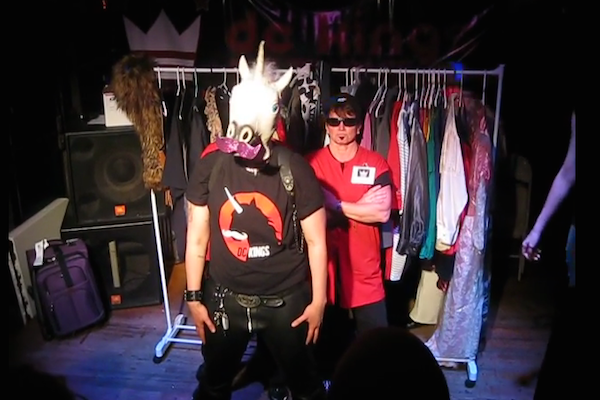
Video: 2006 – 2015 DC Kings on Stage
September 11, 2015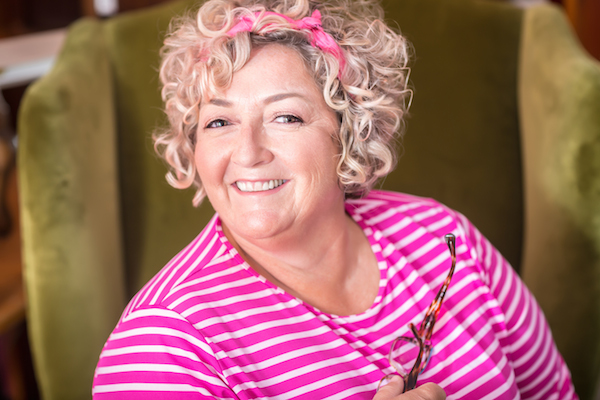
Miss Pixie’s: Redesigning D.C. for Nearly Two Decades
September 11, 2015In a heartfelt letter to the DC Kings troupe, founder Ken Vegas (aka graphic designer Kendra Kuliga) announced the tough call to retire the DC Kings after building a legacy of gender-bending for more than 15 years. Vegas, who produced his first show in 1999 at Club Chaos, grew and groomed the troupe that would later be known as the longest, continuously operating Drag King troupe in the world. The decision was not made lightly.
The DC Kings are a staple in the Washington, D.C., LGBTQ community, unifying people of all gender identities and sexualities with their electric performances. Their presence has brought countless laughs, tears, and epiphanies. And, their retirement will surely leave a void in the hearts of countless fans and community members, in Metro D.C. and abroad. Vegas and the troupe will close the final chapter of the DC Kings with their show at The Bier Baron Tavern on Sunday, September 20. Both the August and September shows benefit local LGBTQ organizations.
The History
“Cheryl A. Spector is the reason why Drag Kings exist in D.C.,” asserts Vegas, citing that they would have eventually found their way, but maintaining that Spector was the first to bring them to D.C. “The Dyke March was big at the time, and they were looking to do a fundraiser. In 1996, Cheryl was at New York City’s Gay Pride, brought the concept to D.C., and convinced the Dyke March to do a fundraiser. It was a Drag King Contest.”
Vegas saw posters plastered around Dupont Circle and entered the contest, on a dare from a friend. To his own astonishment, he won and wanted to do more. Within a few years, Vegas was at the forefront of the D.C. Drag King community. In 1999, he performed on the Main Stage at D.C.’s Capital Pride Festival and caught the eye of Carlos Aguilar, owner of Dupont’s Chaos nightclub. He approached Vegas about producing monthly shows at Chaos.
Drag Kings were new to the D.C. scene, and no one really knew what a Drag King was. However, that didn’t stop Vegas from producing a packed show.
“I started gathering folks right around October 1999,” recalls Vegas. “We did a Halloween Show. I don’t believe in contests, and it was the only contest I’d ever produced. We had a line out the door, pouring into the streets.”
Vegas took some time to gather ideas, plan an approach, and recruit Drag Kings for the troupe’s premiere at Chaos, in March 2000. “It took five months to pull it all together: identifying the Drag King scene, getting people to commit to shows, and getting myself ready. I knew there was an urgency for this kind of performance and this kind of expression. I wanted to start it out right and make sure that I could continue it.”
Vegas has led monthly meetings for the past 15 years, educating the Kings about the direction and vision of the troupe, reviewing performances to discuss what worked, and tackling specific issues to improve individuals and the troupe as a whole. “More than anything, it was just to have a neutral space that wasn’t a performance space to talk about these things.”
And, he instituted an open-door policy, allowing almost anyone with the desire to dress in drag to join. “Anybody who came to our show was qualified to perform on our stage. After every show, we would have announcements to have people come to the next meeting.” And, as one can imagine, almost every kind of person would show up, asking to learn more. Without pre-screenings or auditions, sometimes situations arose that required diffusing.
“Our motto is that we must be respectful and supportive—not only to the Kings, but also to our audience and our venue.” This simple creed has helped shape and define the Kings’ behavior, both on and off the stage.
The Community
“When I started the DC Kings, there was no sense of community in the lesbian world. You either went to Phase or Hung Jury. It was about dating and dancing, not so much about being a unified voice in the community.”
That was early 2000, when lesbians were regarded as ranking significantly below their gay-white-cismale counterparts. Despite social stigmas within the LGBTQ community itself, the DC Kings rose to create a culture of respect and self-expression, educating their audiences about political, social, and queer issues.
“I made sure that we had a dressing room. I made sure that when people were starting to transition, if they felt comfortable walking into the men’s room, the establishment staff was trained to allow it. People like myself and others had to fight for the right to go to the bathroom that represented us.”
Championing these rights for performers, Vegas was in the unique position to right the wrongs to women in our community. And, after spending years establishing relationships with venues, not having a permanent home was part of Vegas’ decision to retire the troupe.
“One of the biggest things that happened to our troupe is the closing of Chaos back in 2008. Apex closed soon after that. Phase 1 kept their doors open, thanks to Angela Lombardi. She was a huge reason why we could continue. When Phase 1 closed in January 2015, I basically started counting the days [until retiring the troupe],” admits Vegas.
“The Kings are important to the lesbian community,” asserts Lombardi, who managed Phase 1 for more than 10 years. “Not only because they provide great entertainment, but they have also offered hundreds of queer individuals a sense of family and a place to explore gender and express themselves through the drag experience.”
It’s this contribution to the community for which the DC Kings will be most remembered. While venues such as The Bier Baron have opened their doors and provided a welcoming space for the Kings to perform, having a queer-focused space makes it possible to meet new Kings and recruit more members to continue the troupe.
Past, Present, and Future
The DC Kings have created a culture of support for individuals looking for friends, community, and a chance to find out who they are and express who they are in a non-judgmental, safe space. Under Vegas’ direction, the troupe has had a significant impact on many, including its performers.
“Performing with the DC Kings was freedom. I discovered myself on that stage,” shares veteran DC King Rocky (aka Sharon Humes), who joined the troupe 12 years ago. “I gained confidence on that stage. I learned how to perfect my craft. Ken recognized my confidence and entrusted me with hosting one of the biggest productions that he put together, called The Great Big International Drag King Show,” Rocky adds.
Hosting that show in front of more than 1,500 people gave Humes the confidence to later accept a position as music minister of her church. “My experiences on the stage with the Kings became parallel with being in front of the congregation. If I hadn’t hosted shows, the transition would have been difficult and, probably, even seen as forced. I was able to relax and enjoy directing, and I just continued to use one to feed the other.”
As for Rocky, performing will always be a part of him—and his future. “That will never go away, but I want to thank Ken for his vision! He needs to know how special he is and how instrumental he has been in people’s lives.”
For newer member Sebastian Katz, group numbers will always hold a significant place in Katz’ heart. From the process of picking the song and coordinating rehearsals, to finding the perfect costumes and preparing for the act backstage, Katz has felt like part of a family. “Because of the DC Kings, I’ve been able to perform alongside all styles of Drag Kings, burlesque performers, musicians, comedians, and more. I’ve gotten so much life-changing inspiration; I’ll be forever grateful,” Katz reminisces.
Although Ken Vegas is retiring the DC Kings as a troupe, Katz plans to continue performing around the District—as do many other members. “The DC Gurly Show has graciously opened up their shows to include spots for Kings, so you’ll still see a lot of us at Freddie’s Beach Bar and Phase 1 [among other venues]. Rick Shaw and I have also joked about starting our own two-man group, ‘Party Boys: You Will Be Disappointed,’ so watch out!”
For Vegas, the biggest event that he is particularly proud of is producing The Great Big International Drag King show at the Black Cat and the 9:30 Club. “Since I started performing as a Drag King in 1996, I dreamed of inviting the best acts from all over the world to come to Washington, D.C., to showcase their talents in two of the best venues in the country.” And, that is exactly what Vegas did.
Is This Really the End?
For the present, Kendra Kuliga (Vegas’ everyday persona) plans to focus on growing Cielo Productions, her graphic design business. Meanwhile, Vegas hopes that there continues to be queer safe space for the next generation to be able to perform and feel validated in the process. He would like to keep producing shows and, perhaps, collaborate with other producers to create new and exciting experiences for both performers and audiences.
Share Your Stories
Are you a past or present DC King? Have you attended DC King shows? Did you have a favorite king? We encourage you to share your stories and memories below in the comments.
MORE DC DRAG KINGS…



